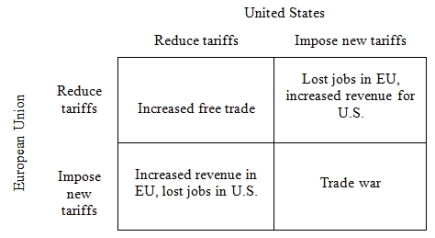Free Trade Game
Free trade occurs when goods and services between countries flow unhindered by government-imposed restrictions such as tariffs, quotas, and antidumping laws that are often designed to protect domestic industries. Although it is well known that free trade creates winners and losers, a broad consensus exists among most economists that free trade has a large and unambiguous net gain for society as a whole. For example, Robert Whaples (2006) finds in a survey of economists that "87.5% agree that the U.S. should eliminate remaining tariffs and other barriers to trade" and that "90.1% disagree with the suggestion that the U.S. should restrict employers from outsourcing work to foreign countries." Despite this consensus, it is not at all clear that countries will actually adopt policies promoting free trade.
Consider the following strategic situation in which the United States and the European Union (EU) are engaged in trade negotiations. Both countries must decide whether to reduce their tariffs or impose new tariffs. The best outcome for both countries is for them to impose new tariffs and for the other side to reduce tariffs; they could then export more easily to the other country and they would obtain increased revenue from the new tariffs. The worst outcome for both countries is for them to reduce tariffs and for the other country to increase tariffs; they would lose jobs as a result of reduced exports and the other country would benefit from their lower tariffs. Of the remaining two outcomes, both countries prefer the outcome in which they reduce tariffs to the one in which they both impose new tariffs. If both countries reduce their tariffs, then each country can benefit from increased free trade. If both countries impose new tariffs, there is a trade war in which each country sees a decline in trade and a loss of jobs. Based on this story, the preference ordering for the EU over the four possible outcomes is:
• Impose; Reduce > ; Reduce > Impose; Impose > Reduce; Impose.
And the preference ordering for the United States is:
• Reduce; Impose > Reduce; Reduce > Impose; Impose > Impose; Reduce,
where the EU's action is given first, the United States' action is given second, and ">" means "is strictly preferred to."
Using the ordinal preferences (4, 3, 2, 1) to capture these preference orderings, fill in the empty payoff matrix. Based on the preference orderings in the Free Trade Game.
Figure 1: Free Trade Game

-Using the payoffs from the Free Trade Game, what is the present value of reducing tariffs?
Definitions:
Slave Resistances
Acts of defiance or rebellion by enslaved people against their conditions and slaveholders, ranging from work slowdowns to armed uprisings.
Florida
A southeastern U.S. state known for its beaches, theme parks, and as a popular retirement destination.
German Immigrants
People originating from Germany who migrated to other countries, significantly influencing the cultural and societal landscapes of those nations, particularly the United States.
Assimilated
The process by which individuals or groups of differing ethnic heritage are absorbed and integrated into the dominant culture of a society.
Q1: You receive an automated telephone call from
Q1: Buyers include all of the following EXCEPT
Q2: Critics have faulted functionalist theories for being
Q5: As part of the associative network memory,
Q12: Which of the following is not a
Q12: The Exit, Voice and Loyalty game explains
Q15: Let's assume that experience from recent elections
Q30: Which of the following statements best describes
Q46: Dictatorships that rely on their family and
Q50: Collective action theory indicates that individuals will